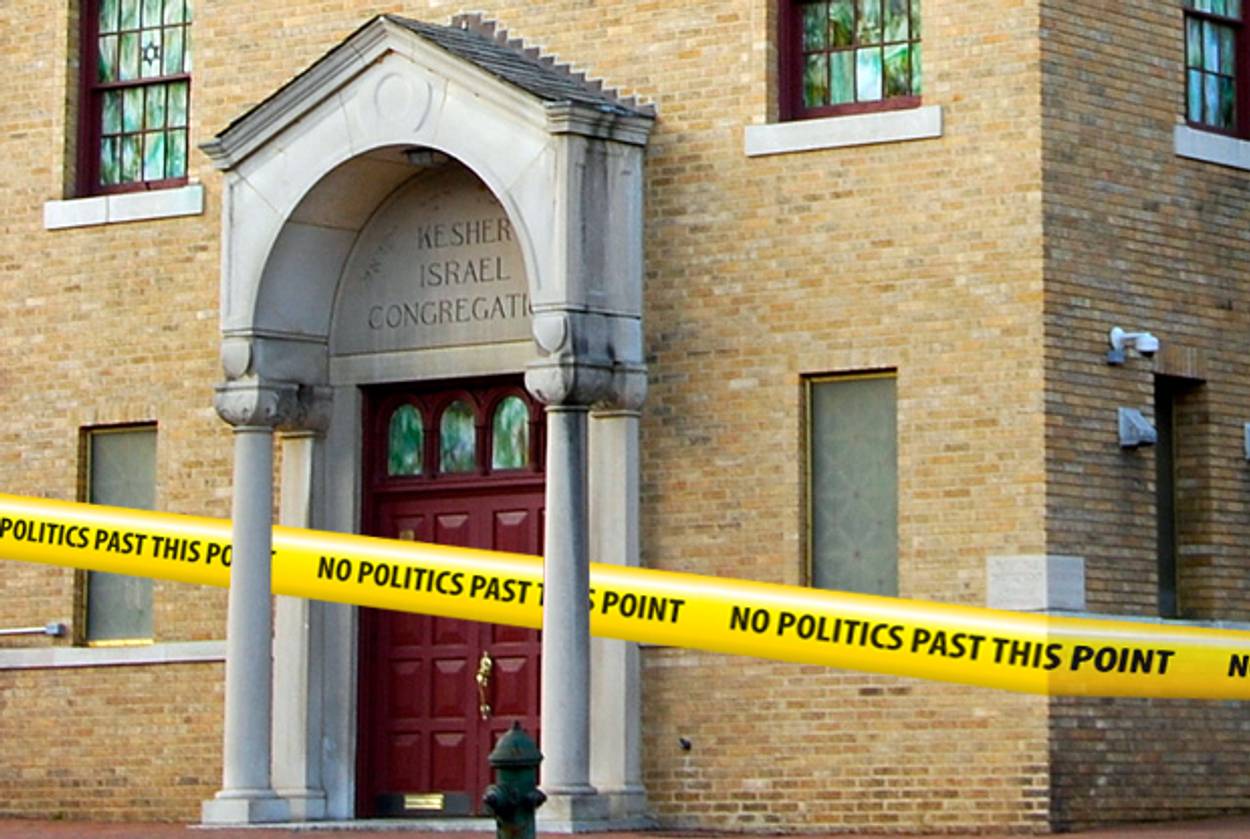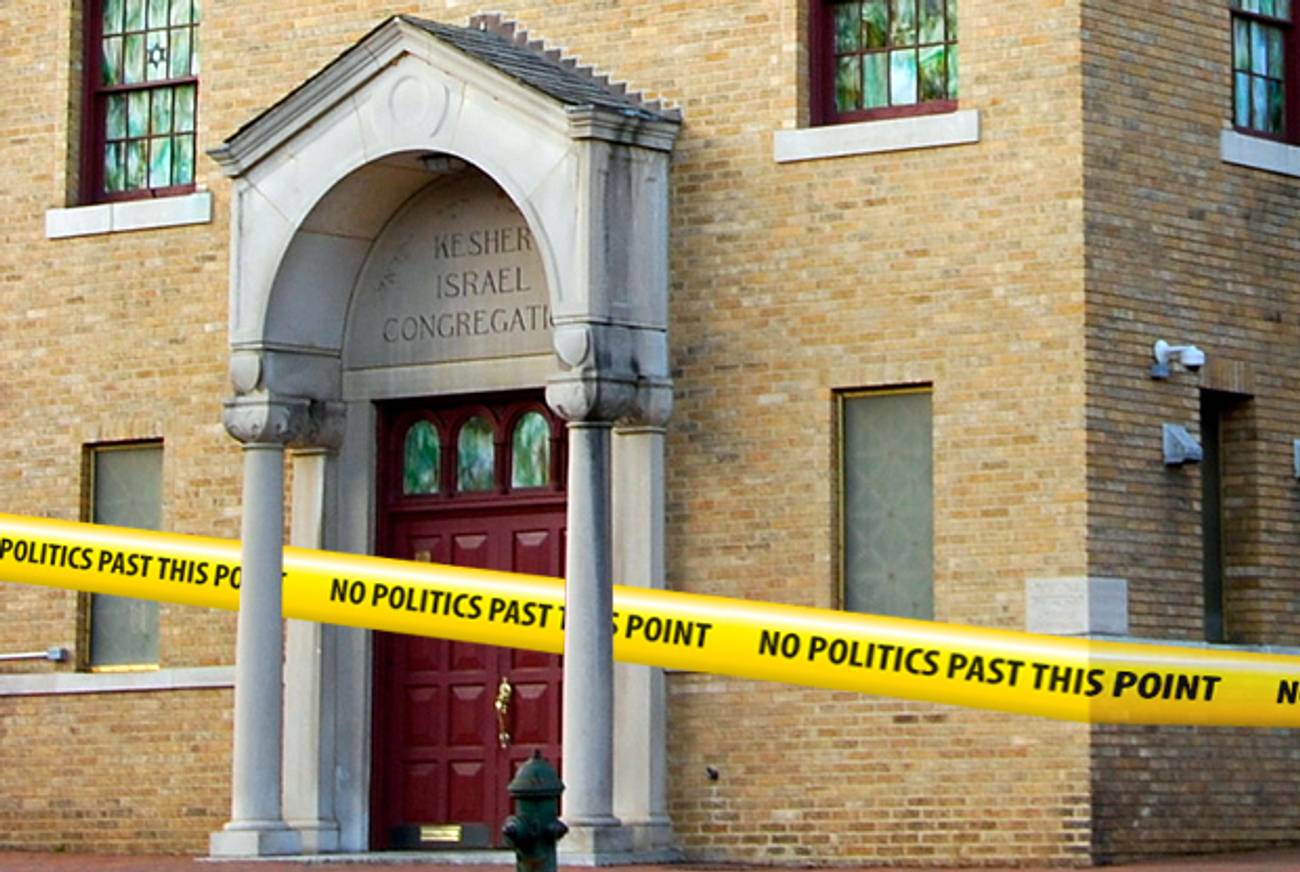Politics on the Pulpit
As the presidential election nears, rabbis debate whether partisanship is part of their job description




Chances are good that if you head to Kesher Israel in Washington, D.C., on a typical Shabbat morning for services, you’ll be praying alongside Sen. Joseph Lieberman or White House Chief of Staff Jack Lew. Located in the heart of the nation’s capital, the Orthodox synagogue has played host to noted political activists and Supreme Court justices and will soon fete New York Times columnist David Brooks for a dialogue about Judaism in America. Yet there’s one place at Kesher where you won’t find even a hint of politics: the pulpit.
“I will talk about halakhah [Jewish law]. I will talk about the morality of an issue. But I won’t talk about politics, and I didn’t before I lived in Washington, because I don’t think rabbis have political science degrees,” said Rabbi Barry Freundel. “I separate between my personal opinions and things that are clearly in Jewish sources.”
Jewish law, Freundel explained, is not meant to apply in most cases to non-Jews. Thus, when he wrote a lengthy scholarly article about health care in the Jewish legal tradition—which, he added, was read by Hillary Clinton, and representatives of the Obama and Romney campaigns—he purposefully disclaimed any religious imperative for the contents. “The article says explicitly: If you think there are good ideas in here, use them. But there is no way this applies to America as a matter of law or priority. We don’t impose halakhah on non-Jews, except in the area of the Seven Noahide Laws,” a small set of very basic moral principles that prohibit adultery and murder.
Rabbi Andy Bachman of the Reform Congregation Beth Elohim in Brooklyn takes a very different approach. “Politics definitely has a place in the pulpit,” he told me. “For instance, one can draw a connection in Torah to the living wage, to gaps between rich and poor, one can enlighten a community about models of dissent, whatever the case may be.”
Whereas Freundel considers his political preferences a personal matter and laughs off the idea of a congregant consulting him for electoral advice, Bachman is not shy about his political convictions: There’s an Obama bumper sticker on his car, and both he and his associate Rabbi Shira Koch Epstein are members of Rabbis for Obama. While Bachman said he usually refrains from making baldly partisan pronouncements from the pulpit, he is fully comfortable making them in the context of classroom, text study sessions, and on his Facebook page, which he regularly updates. A conversation with him quickly jumps from the Book of Samuel, to the perils of political power, to the problems engendered in Israeli and American politics this year by conservative casino magnate Sheldon Adelson’s outsized campaign contributions.
“I don’t think any of these things should be avoided, because they’re very much part of the public discourse,” Bachman said. “And if synagogues aren’t relevant to the public discourse then they’ve lost their way. Judaism has to be relevant and meaningful to every generation.”
Though members of the clergy, as representatives of tax-exempt 501c3s, are legally prohibited from endorsing political candidates, they can speak out on particular issues—like abortion and gay marriage—in a manner that leaves little doubt where they stand.
But Freundel worries that when religion turns to politics, partisanship can reduce a rich tradition to talking points. “On both sides of the political spectrum, you have people who have tried to equate Judaism with a particular political philosophy,” he said. “It isn’t. And if it is, then somebody has a problem, because it means that whatever political group you’re talking about has now become ‘Jews,’ or it means that Judaism has lost its message and no longer has anything unique to say.”
It’s an old controversy. For many decades, rabbis have debated the place of politics in American Jewish life. For some, Jewish texts become irrelevant if they are not made to speak directly to the pressing issues of the day. For others, the tradition is made superfluous when it becomes near indistinguishable from a particular political platform or party.
Back in the 1980s, prominent Reform Rabbi Daniel Jeremy Silver criticized his own movement for becoming synonymous with American liberalism, writing that “what was called prophetic Judaism was often a political statement more than a statement of concern about Jewish religious life.” (Tellingly, he noted, when the Reform movement established a lobbying center in Washington, it initially dubbed it the “Social Action Center,” and only later renamed it the “Religious Action Center.”) Other Jewish leaders however, like Abraham Joshua Heschel, stressed the interconnection of religious reflection and political action and marched for causes like civil rights under the banner of Jewish tradition.
It’s a split that remains evident today in the American-Jewish political conversation, particularly between Orthodox and non-Orthodox rabbis. While the former tilt conservative in their voting preferences, they tend to eschew politics and partisanship in the synagogue; the latter, on the other hand, believe the pulpit must address such concerns. In one recent example, Rabbi Sharon Brous, spiritual leader of the buzzed-about independent minyan IKAR in Los Angeles and another member of Rabbis for Obama, chose to use her most important sermon of this year—Yom Kippur—to defend religion’s role in politics.
“I do believe that Torah is an inherently political document, and I do believe that our tradition leaves us with a vision of what’s possible in the world and that certain party platforms more closely align themselves with that vision than others,” Brous told me. “Part of my obligation [as a rabbi] is to speak about moral issues that are affecting us today, and there are politicians and policies that I think are more aligned with Jewish values.” For her, the choice in next month’s presidential election is a stark one: “I think looking at the platforms for the two parties it seems clear to me that a lot of what I hold dear as a Jew” stands in the balance.
But for Asher Lopatin, rabbi of the Modern Orthodox synagogue Anshei Sholom B’nai Israel in Chicago, political exhortations risk alienating the people he wishes to reach. “The pulpit is a very holy place and should really be used to get people to think and to grow, not to push a particular agenda,” he says. “My approach is really based on making the shul comfortable and open, so that people do not feel judged or preached to. So, I definitely try to keep politics out of my sermons—anything that’s said from the pulpit or in a class—because I feel that it works against the goal which is to make people feel more welcome and not less.”
It’s not that Lopatin lacks opinions, he just doesn’t see those sorts of judgments as part of his job description. “I think that synagogues have to be a place of tolerance, both for people with views on the right and people with views on the left,” he said. “I take great pride that we have people who are involved in J Street and I’m very close with them, and we have people who are to the right of AIPAC—even to the right of the ZOA—and they feel comfortable coming. I think if you don’t have that kind of diversity in the synagogue, you should worry that you’re not doing a good enough job of bringing people in.”
Perhaps Lopatin’s most famous congregant is Chicago Mayor and former White House Chief of Staff Rahm Emanuel. Lopatin delivered the first invocation at the Chicago City Council after Emanuel was inaugurated, and the rabbi believes his approach is part of what draws the mayor to the congregation. “I think he feels comfortable in the synagogue because I don’t push a political agenda.”
Lopatin has made exceptions to his rule in extreme cases, like denouncing genocide in Darfur and calling out far-right Israeli rabbis who have urged religious soldiers to disobey orders from their commanders. And he’s happy to host politicians—like Republican Sen. Mark Kirk and Democratic Sen. Dick Durbin—as long as they speak after services, so people can choose whether or not to stay.
Ultimately, Lopatin views his role more as consciousness-raising than partisan campaigning. “We have to wake people up. A rabbi should not ignore what’s going on in the world,” he said. “I do want people to contend with issues and think about them—whether it’s tax or fairness in income disparity—but as moral concerns, not political ones.” He said he wants his congregants to grapple with the issues, but he has no desire to dictate to them what conclusions they should draw.
As the election approaches, rabbis across America will continue to argue over the role of Judaism in the national political conversation. If history is any guide, it’s not a dispute that’s likely to be resolved any time soon. As one rabbi quipped to me, citing a famous saying of Pirkei Avot, “Any argument which is for the sake of Heaven is destined to endure.”
***
Like this article? Sign up for our Daily Digest to get Tablet Magazine’s new content in your inbox each morning.
Yair Rosenberg is a senior writer at Tablet. Subscribe to his newsletter, and follow him on Twitter and Facebook.
Yair Rosenberg is a senior writer at Tablet. Subscribe to his newsletter, listen to his music, and follow him on Twitter and Facebook.